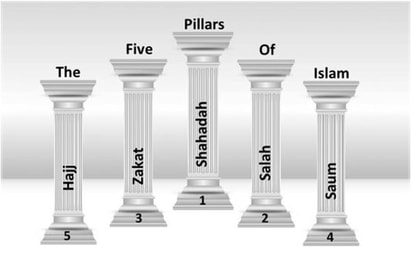 Five Pillars of Islam Five Pillars of Islam Amidst glowing lamps, heart-warming devotional songs and hundreds of devotees, some people feel possessed by the immortal and act weirdly while others remain normal. Are these individuals hard-wired to experience God or are they the blessed few to receive His ultimate blessings? That’s neurotheology for you! Neurotheology Neurotheology or ‘spiritual neuroscience’ helps a person understand the underlying relationship between brain science and religion. This is a diversified domain that includes fields of theology, religious experiences and studies, philosophy, cognitive science, neuroscience, psychology and anthropology. Neuroscience is the study of nerve cells and theology is the study of God. Since time immemorial, there are plenty of important yet unanswered questions on religion such as Who is God? Am I religious? But till recent years there was no impending research done on the neurological study of religious and spiritual experiences. Dr. Andrew Newberg is a neuroscientist who is a pioneer in this research experiences (neurotheology). Science and religion are considered to be two different poles that repel each other but what the common man forgets is that, both are sculpted deeply in the inner workings of the human brain. Holistic Perspective: Brain is divided into two hemispheres-left and right. Each has its own potential advantages and contributes to the smartness of an individual. The right hemisphere always sees things in whole rather than the intricate details within it. For example, it sees the whole human body disregarding the cells and organs that comprise it. Looking at it from the spiritual perspective, humans understand the concept of absolute oneness as pertaining to God. This makes a person feel the presence of God anywhere and everywhere, whatever might be the research done or deciphered. Quantitative Perspective: Quantitative approach greatly helps in mathematics and also serves as the foundation to understand science and scientific methods. Scientists explain the universe based on mathematics and such quantitative descriptions have hugely influenced philosophers such as Pythagoras who used maths to explain the nature of universe and God. Pythagoreans believed every matter to be made of numbers and equated it to digits-one represents origin, two represents matter, three was considered as the ideal number, four consisted of the four elements and seven represented the seven planets (although now scientists insist on few other planets too existing in the solar system). Three was considered to be the symbol of the Greek God Apollo. The Bible uses specific numbers repeatedly, for example the number 40 (40 days and 40 nights, Jews wandering the desert for 40 years, etc.). Islam also uses special numbers in the Quran. Sunni Muslims believe in the Five Pillars of Islam and the Six Articles of Belief. Binary Perspective: We always talk about two sides of a coin such as good vs evil or justice vs injustice. Religion always plays a critical role in solving the problems created by these opposites. Theology understands these opposites, the problems created by them and how such problems are solved by religious beliefs. Willingness & Behaviour: Brain functions help humans accommodate themselves within the world and possess the ability to support wilful or purposeful behaviour. Such wilful function is said to arise from the frontal lobes that are predominantly involved in planning, coordinating movement and behaviour and initiating and developing language skills. There are also research evidences showing that the frontal cortex is activated when an individual performs meditation or prayer as the person shows complete focus on the specific activity. Meditation comes with its own set of advantages as described in www.firsteatright.com. The Pioneer in Neurotheology: Dr. Andrew Newberg A pioneer in neurological study of religious and spiritual experiences, Dr. Andrew tried to understand the nature of religious and spiritual practices and attitudes by scanning the brains of those individuals immersed in prayer, meditation, rituals and transcendental states. Beliefs rely solely on emotions, cognition, perception and social interaction and starts developing right after birth. Only change is that, these beliefs are chiselled by the way we think, feel and experience in our course of life. We are what we think. Beliefs can have a constructive or destructive effect on our body. They can either make us feel good, positive, adapt better to the surrounding environment and result in better overall health or cause stress, downgrade our health and make us behave violently towards others. Andrew Newberg’s research indicates that brain is the only path through which we can question about God, understand God or experience God. But, one question that even our brain cannot answer is whether or not God exists. When a person sees an image, different parts of the brain are activated but we can never conclude whether there is a picture or whether the person is creating the picture in his/her own mind. A Dedicated Brain Part for Spirituality Religion and spirituality are complex processes involving emotions, sensations, thoughts and behaviours and there is extremely limited scope that these processes arise solely from one part of the brain. Researchers feel that multiple structures in the brain work together to experience such religious and spiritual feelings. Although Andrew’s research indicates that the temporal lobe (most importantly, amygdala and hippocampus) plays a vital role in meditation, experiences of vision and memory, this lobe definitely interacts with other parts of the brain to bring out complete religious and spiritual experiences. While religious experiences and brain disorders are always related to each other, it is always not true. Normal individuals do have normal or abnormal religious experiences and likewise, abnormal people too have normal or abnormal religious experiences. Our brain primarily performs two functions, self-maintenance and self-transcendence, all through our lives and surprisingly, religion too performs these two functions. This is more than enough to prove that brain and religion go hand in hand and will remain forever unless there are any changes fundamentally. How Do Religious Practices Shape an Individual? Newberg and his team of researchers used brain imaging studies to understand what happens inside people’s mind when there are deeply involved in religious practices like meditation or prayer. Then, they compared it with the same brain when it was in a state of rest. Brain scans of people involved in meditation showed increased activity in the limbic system (regulates emotions) and decreased activity in the parietal lobe (part of the brain responsible for space and time orientation). Buddhist monks and Carmelite nuns whose brains were scanned during meditation and prayer showed increased activity in the frontal area (concentration) but those who spoke during the religious meet showed decreased activity in the same area. While these nuns claim their souls to have mingled with God and Buddhist monks claim to strive for unity in the world by focusing their thoughts on a sacred object, researchers feel that they are not proofs of interaction with a supreme power but mere blips in brain chemistry. The researchers comment that attaining a transcendental experience is easy as the human brain is wired in such a way and this is the reason why every culture has a definite religious base making it an indispensable part of humanity. Religion & Health Neurotheology can also prove to be extremely useful in providing scientific information by understanding the link between spirituality and health. Religion can affect health positively-physical and psychological. Research in the forthcoming periods can help individuals understand the reason behind decreased blood pressure, lower heart rates, decreased anxiety and depression levels due to meditation and other religious practices. There are a number of studies already that show positive and negative effects on mental and physical health due to spirituality. These studies show that religious people experience improvements in depression and anxiety, enhanced immune system and reduced mortality rates. Research also shows that people who have mixed religious beliefs or strict negative views of God and religion experience increased stress, anxiety and health problems. Neurotheology offers a great potential to delve into the intricacies of the human mind and body. It even has the potential to help us understand the universe in the right way and our place within it. It can serve as the connecting factor to bridge the science of neurology to the spirit of theology. Comments are closed.
|
AVOID FRAUD. EAT SMART.+91 7846 800 800
AuthorDietitian & Nutritionist Dr. Nafeesa Imteyaz. Archives
July 2024
Categories
All
Dr. Nafeesa's Blog @blogspot |
- Home
- Written Testimonials
- Consult
- Clinics
- Blogs
-
Diet & Nutrition
- Diabetes Reversal
- IVF IUI not needed for PCOS PCOD Infertility
-
Medical Nutrition
>
-
Disease & Conditions
>
- Infertility | PCOS
- Diabetes Mellitus
- Cholesterol
- Hypothyroid
- Kidney Problems
- Hypertension
- Cardiovascular Diseases
- Liver Diseases
- Gastro intestinal disorder
- Cancer
- Metabolic Disorders
- Orthopedic Disorders
- Eating Disorders
- Dietary Recall
- Weight Record Filled By Clients
- Online Payment Transaction Details
- Online Clients Weight Check Form
- Our Program Package Service Charges
- Weight Record 2017 Clients
- Measurements sent by Clients
- Terms & Conditions Of Payment
- Thanks. Your Form is Submitted
- Video Testimonials
- Lifestyle & Wellness
- Lifestyle & Wellness Blog
- Allergy & Intolerance
- Weight Loss / Gain
- Weight Loss / Slimming Blog
-
Disease & Conditions
>
- Life Cycle Nutrition >
- Sports Nutrition >
- Integrity in Nutrition
- Knowledge Centre
© COPYRIGHT 2022. ALL RIGHTS RESERVED. FRST HEALTHCARE PVT LTD.
Dr. Nafeesa Imteyaz of First Eat Right clinic, is the Best Dietitian Nutritionist in Bangalore. Best Dietitian Nutritionist in Pune. Best Dietitian Nutritionist in Hyderabad. Best Dietitian Nutritionist in Chennai. Best Dietitian Nutritionist in Mumbai. Best Dietitian Nutritionist in Delhi. Best Dietitian Nutritionist in Kolkata.


